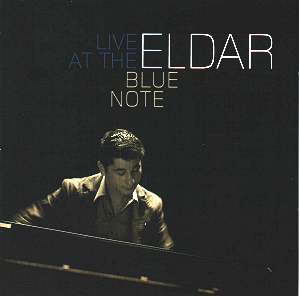1. What is This Thing Called Love?
2. Someday
3. You Don’t Know What Love Is
4. Daily Living
5. Dat Dere
6. Besame Mucho
7. Straight, No Chaser
8. Sincerely
9. Chronicle
10. Take the A Train
Eldar – Piano
Marco Panascia – Bass
Todd Strait – Drums
Chris Botti – Trumpet (track 3)
Roy Hargrove – Trumpet (track 7)
"Then
felt I like some watcher of the skies When
a new planet swims into his ken…" Well,
it wasn’t quite like that when I heard for
the first time a track by pianist Eldar Djangirov
on Humphrey Lyttleton’s BBC radio jazz programme
– but it was certainly an astonishing experience.
The sheer virtuosity of Eldar’s playing in
What is This Thing Called Love? was
enough to make one catch one’s breath and
wonder: who is this musician? He was actually
a boy aged eleven when he left his native
Kyrgyzstan for the USA, where he became good
enough to play at New York’s Blue Note club.
This set was recorded there last October,
with Eldar’s trio joined by a couple of guest
trumpeters for one number each.
From
the very first track, it is evident that Eldar
Djangirov is an important new jazz talent,
with an astonishing technique. His facility
at the piano puts one in mind of such virtuosi
as Oscar Peterson and Michel Petrucciani:
indeed, you might describe him as an updated
version of Art Tatum. He negotiates difficult
runs with fluent ease, devises inventive solos,
and remembers that the blues is at the heart
of jazz. His performance of Dat Dere
combines the funkiness of the blues with a
mixture of daring and delicacy which is mightily
impressive.
He
is also a composer, contributing four of his
own tunes to this album. Someday and
Daily Living are attractively buoyant
pieces, while Sincerely is a delicate
ballad. Chronicle might be by McCoy
Tyner, with swirling chords behind lively
right-hand twirls.
Chris
Botti joins the trio for a thoughtful You
Don’t Know What Love Is, and Roy Hargove
comes in for the beboppish Straight, No
Chaser. On these tracks, one’s attention
is caught by the way that Eldar accompanies
the trumpeters as well as by his often startling
solos.
The
closing Take the A Train is as astonishing
as the opening track, throwing in some muscular
stride piano alongside breathtaking runs and
witty interjections. This track only lasts
for two-and-a half minutes but it is mind-blowing.
If Eldar plays this well when he is just out
of his teens, one wonders how much further
he can develop. It should be fascinating to
hear.
Tony Augarde
see
also review
by Don Mather
